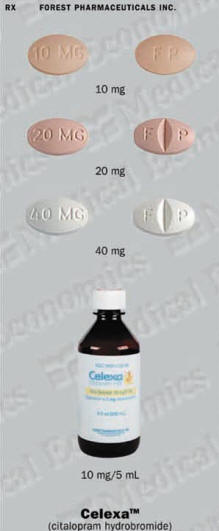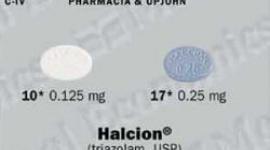Celexa (Citalopram Hydrobromide) Patient Information
Find out why Celexa is prescribed, side effects of Celexa, Celexa warnings, effects of Celexa during pregnancy, more - in plain English.
Pronounced: sell-EX-ah
Celexa (citalopram) Full Prescribing Information
Why is Celexa prescribed?
Celexa is used to treat major depression--a stubbornly low mood that persists nearly every day for at least 2 weeks and interferes with everyday living. Symptoms may include loss of interest in your usual activities, insomnia or excessive sleeping, a change in weight or appetite, constant fidgeting or a slowdown in movement, fatigue, feelings of worthlessness or guilt, difficulty thinking or concentrating, and repeated thoughts of suicide.
Like the antidepressant medications Paxil, Prozac, and Zoloft, Celexa is thought to work by boosting serotonin levels in the brain. Serotonin, one of the nervous system's primary chemical messengers, is known to elevate mood.
Most important fact about Celexa
Be careful to avoid taking Celexa for 2 weeks before or after using an antidepressant known as an MAO inhibitor. Drugs in this category include Marplan, Nardil, and Parnate. Combining Celexa with one of these medications could lead to a serious--even fatal--reaction.
How should you take Celexa?
Celexa is available in tablet and liquid forms. Take either formulation once a day, in the morning or evening, with or without food. Although your depression will begin to lift in 1 to 4 weeks, you should continue taking Celexa regularly. It takes several months for the medication to yield its full benefits.
--If you miss a dose...
Take it as soon as you remember. If it is almost time for your next dose, skip the one you missed and go back to your regular schedule. Do not take 2 doses at the same time.
--Storage instructions...
Store at room temperature.
What side effects may occur when taking Celexa?
Side effects cannot be anticipated. If any develop or change in intensity, inform your doctor as soon as possible. Only your doctor can determine if it is safe for you to continue taking Celexa.
-
-
More common side effects of Celexa may include: Abdominal pain, agitation, anxiety, diarrhea, drowsiness, dry mouth, ejaculation disorders, fatigue, impotence, indigestion, insomnia, loss of appetite, nausea, painful menstruation, respiratory tract infection, sinus or nasal inflammation, sweating, tremor, vomiting
-
-
Less common side effects may include: Amnesia, attempted suicide, confusion, coughing, decreased sexual drive, depression, excessive urination, fever, gas, impaired concentration, increased appetite, increased salivation, itching, joint pain, lack of emotion, loss of menstruation, low blood pressure, migraine, muscle pain, rapid heartbeat, rash, skin tingling, taste disturbances, visual disturbances, weight gain, weight loss, yawning
-
Rare side effects may include: Abnormal dreams, acne, aggressive behavior, alcohol intolerance, angina (chest pain), arthritis, belching, bone pain, breast enlargement, breast pain, bronchitis, bruising, chills, conjunctivitis (pinkeye), decreased muscle movements, delusions, dermatitis, difficulty breathing, difficulty swallowing, dizziness, drug dependence, dry eyes, dry skin, eczema, emotional instability, excessive milk flow, excessive muscle tone, eye pain, fainting, feeling of well-being, flu-like symptoms, flushing, frequent urination, gum inflammation, hair loss, hallucinations, heart attack, heart failure, hemorrhoids, high blood pressure, hives, hot flashes, inability to hold urine, inability to urinate completely, increased sex drive, increased urination, involuntary muscle movements, leg cramps, mouth sores, muscle weakness, nosebleeds, numbness, painful erection, painful urination, panic, paranoia, pneumonia, psoriasis, psychosis, ringing in the ears, sensitivity to light, skin discoloration, slow heartbeat, stomach and intestinal inflammation, stroke, swelling, teeth grinding, thirst, uncontrollable muscle movements, unsteady or abnormal walk, vaginal bleeding
Why should this drug not be prescribed?
If Celexa gives you an allergic reaction, you cannot continue using it. Also remember that Celexa must never be combined with an MAO inhibitor (see "Most important fact about this drug," above).
Special warnings about Celexa
Read FDA warning covering all antidepressants and the possibility of suicidal thoughts and behaviors in children, adolescents and adults. More details here.
In recommended doses, Celexa does not seem to impair judgment or motor skills. However, a theoretical possibility of such problems remains, so you should use caution when driving or operating dangerous equipment until you are certain of Celexa's effect.
There is a slight chance that Celexa will trigger a manic episode. Use Celexa with caution if you suffer from manic-depression (bipolar disorder). Use caution, too, if you are over 60 years old, have liver or kidney problems, suffer from heart disease or high blood pressure, or have ever had seizures.
Possible food and drug interactions when taking Celexa
Celexa does not increase the effects of alcohol. Nevertheless, it's considered unwise to combine Celexa with alcohol or any other drug that affects the brain. (Be particularly careful to avoid MAO inhibitors.)
If Celexa is taken with certain other drugs, the effects of either could be increased, decreased, or altered. Tell your doctor about any prescription or over-the-counter drugs you are planning to take, and be especially certain to check with him before combining Celexa with the following:
Carbamazepine (Tegretol)  Cimetidine (Tagamet)
Cimetidine (Tagamet)
Erythromycin (Eryc, Ery-Tab)
Fluconazole (Diflucan)
Itraconazole (Sporanox)
Ketoconazole (Nizoral)
Lithium (Lithobid, Lithonate)
Metoprolol (Lopressor)
Omeprazole (Prilosec)
Other antidepressants such as Elavil, Norpramin, Pamelor, and Tofranil
Sumatriptan (Imitrex)
Warfarin (Coumadin)
Special information if you are pregnant or breastfeeding
The effects of Celexa during pregnancy have not been adequately studied, and the potential for harm has not been ruled out. If you are pregnant or plan to become pregnant while on Celexa therapy, tell your doctor immediately.
Celexa appears in breast milk and will affect the nursing infant. You should consider discontinuing either breastfeeding or Celexa. Talk with your doctor about the pros and cons of each option.
Recommended dosage for Celexa
ADULTS
The recommended starting dose of Celexa tablets or oral solution is 20 milligrams once a day. Dosage is usually increased to 40 milligrams once daily after at least a week has passed. Do not exceed 40 milligrams a day. For older adults and those who have liver problems, the recommended dose is 20 milligrams once a day.
Overdosage
Any medication taken in excess can have serious consequences. If you suspect an overdose, seek medical attention immediately.
- Symptoms of Celexa overdose may include: Amnesia, bluish or purplish discoloration of the skin, coma, confusion, convulsions, dizziness, drowsiness, hyperventilation, nausea, rapid heartbeat, sweating, tremor, vomiting
Celexa (citalopram) Full Prescribing Information
Celexa medication guide
APA Reference
Staff, H.
(2009, January 3). Celexa (Citalopram Hydrobromide) Patient Information, HealthyPlace. Retrieved
on 2026, February 18 from https://www.healthyplace.com/other-info/psychiatric-medications/celexa-citalopram-hydrobromide-patient-information

